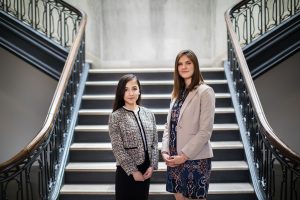By Erica K. Brockmeier

Bringing home a bad apple or two from the grocery store might not seem like a huge deal to the average consumer. But for producers and sellers of fresh fruits and vegetables, the staggering 40% of food that goes bad before it even reaches a store means mounds of wasted food and nearly $1 trillion in lost profits.
Now, thanks to a 2019 President’s Innovation Prize (PIP) award, seniors Katherine Sizov of Alexandria, Virginia, and Malika Shukurova of Samarkand, Uzbekistan, plan to address the issue and optimize the produce supply chain. The prize will help them grow their novel biosensing technology startup company Strella Biotechnology.
Sizov, who is majoring in molecular biology, likes to ask everyone the same question when talking about Strella: “How old do you think an apple in a grocery store is?” As it turns out, an apple from a store may have been in storage anywhere from a couple months to up to more than a year. “That’s one fact that you don’t really consider when you go into a store because you’re so used to seeing fresh fruit,” she says.
The idea for Strella came to life when Sizov, who was previously doing undergraduate research on neurodegenerative disorders, found herself reading papers outside of her main area of study and chatting with Shukurova about what she learned about food waste. The two friends had met during freshmen year through the Penn Russian Club.
That 40% of all fresh produce going to waste is what motivated Sizov. “I thought it was the most ridiculous number in the world,” she says. “This clearly is a problem that could be solved, and, since ag is a bio space, I thought we could use the technical knowledge that we have to solve the problem.”
Shukurova, a bioengineering major, quickly became interested in seeking a solution with Sizov. “At that time I was becoming increasingly interested in the technical aspects [of the problem], and more focused towards building a solution by sensing,” she says. Their complementary areas of technical expertise, and two years of friendship, led to a collaboration.
They soon found a potential approach: Ripening fruits release ethylene gas, and the amount of the gas correlates with a fruit’s ripeness. The challenge, however, is that man-made compounds do not bind ethylene with much specificity, so it’s a difficult gas to measure.
Strella’s solution? “Hack the fruit,” says Sizov, explaining that fruits can already measure ethylene themselves. Placing a ripe banana next to an unripe banana, for example, causes the unripe fruit to ripen more quickly. “Why reinvent the wheel? Let’s use what a fruit uses to sense ethylene,” she says.
After Sizov “hacked” the fruit and had a potential biosensor in hand, Shukurova’s experience and technical knowledge in bioengineering gave her knowledge on both the electronic and biological aspects of the problem. Their patent-pending sensor is now a “leading ripeness indicator” that Strella can monitor on a constant basis.
But bringing their biosensor to market means overcoming technical and biological challenges, including biosensor stability and powering the electrical components that collect data. Sizov and Shukurova put together a team of people with complementary knowledge, including Zuyang Liu, an electrical engineering master’s student; Reggie Lamaute, an undergraduate studying chemistry and nanotechnology; and Jay Jordan, who has previous experience in sales and market development in agriculture.
Strella biotechnology came together thanks to a number of programs and resources at Penn, including the Wharton VIP-Xcelerate, the Wharton VIP Fellows program, Weiss Tech House, the Wharton Undergraduate Entrepreneurship Club, the Penn Engineering Miller Innovation Fellowship, and courses offered as part of the Engineering and Entrepreneurship Program. Sizov and Shukurova also say that Penn’s openness to innovation and the numerous resources for would-be entrepreneurs has expedited their success.
Mentorship was also crucial for the success of their startup, with both naming Sevile Mannickarottu and their PIP mentor, Jeffrey Babin, as instrumental resources. Babin, who first met Sizov when she took his engineering entrepreneurship lab and who later served as her Wharton accelerator program advisor, says that Sizov was able to take skills she gained in the classroom and directly apply them in business scenarios. “She’s fearless in terms of picking up the phone and talking to strangers, gauging the market place, and taking on the tough issues in starting a company,” he says.
Continue reading at Penn Today.
